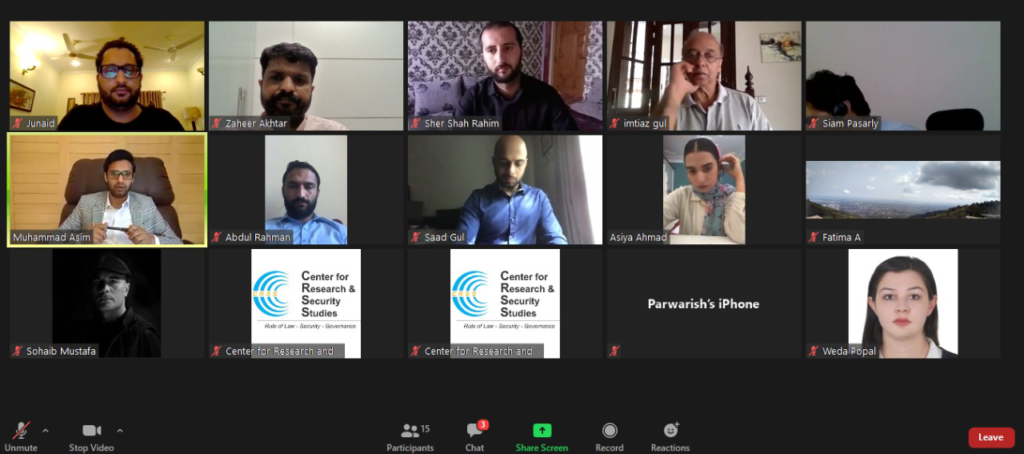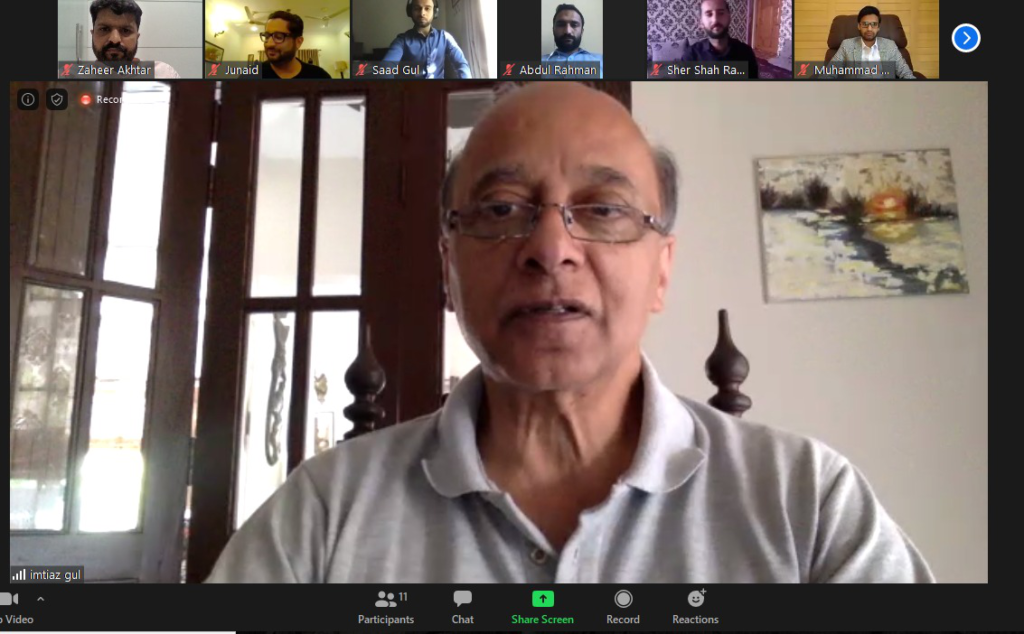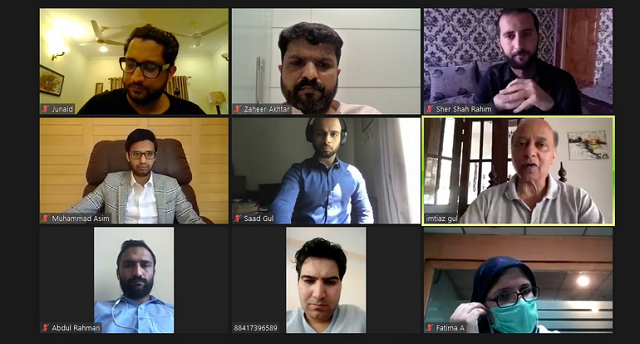May 20, 2020
As part of the Center for Research and Security Studies (CRSS) ongoing Pak-Afghan Trade and Economic Connectivity initiative since 2017 which is aimed at improving business cooperation and exploring ways of developing partnerships and joint ventures, CRSS organized the second virtual Pak-Afghan Youth Entrepreneurs Conference on May 18, 2020, on Zoom. The idea behind this conference was to invite enthusiastic and eminent youth entrepreneurs from Pakistan and Afghanistan as keynote speakers; allowing them to share their knowledge, experience, and strategies amongst the other entrepreneurs. An additional objective was to provide the participating entrepreneurs with the opportunity to adapt to the ideas discussed in the conference and devise digital strategies for their businesses amid the global pandemic. Around fifteen entrepreneurs from Pakistan and Afghanistan attended the event.

Addressing the conference, Mr. Imtiaz Gul, Executive Director, CRSS welcomed all the participants. He expressed his gratitude regarding the youth entrepreneurs of both countries willingness to participate in such virtual conferences to share their expertise with fellow businesspersons even during the ongoing global crises. Through these webinars, many youngsters can obtain the strategies required to augment their businesses amid the current COVID-19 outbreak.
Furthermore, Mr. Imtiaz Gul shared how the closure of the Pak-Afghan border proved to be a major challenge in recent times as the cease of trade operations via the border was denting both the traders and the local Afghans. However, since the issue has been highlighted by CRSS on various television programs, print/social media platforms and several meetings with relevant government stakeholders have taken place, the Pakistan government has decided to open its borders for transit and bilateral trade around the clock at Torkham and Chaman borders.

One of the keynote speakers, Ms. Fatima Anila, CEO & Director Alishverish Enterprises Pvt. Ltd. presented some recent cases studies of businesses that improvised their strategies during the COVID-19 outbreak and have successfully amplified their businesses.
She further reiterated that to sustain their businesses during the current challenges, the entrepreneurs should revamp their business models. She illustrated the example of Zoom, which through responding efficiently and appropriately to the current global situation, captured the market and enhanced their business efficaciously. Zoom also introduced several packages for educational institutes that proved to be extremely popular: thus, resulting in a significant increase in their customer base. Microsoft has also responded well considering the current situation by making several modifications in their applications and improvising their strategies to suit their customers.
In Pakistan, the telecom sector came up with a number of communication packages which were conducive for the users. Many businesses enhanced their market share by adapting smart social media marketing strategies. She further suggested that the entrepreneurs should aim to understand the market demand. Quoting the example of the garment industry, she explained that many garment industries in Pakistan have started making protection suit kits in their stitching units. By doing so, not only have they successfully fulfilled the country’s demand, they have also generated a massive revenue which would not have been possible had they remained with their original production plans.
She proposed that female entrepreneurs with limited resources can initiate various businesses such as the stitching of PPEs, masks, and production of sanitizers. In her concluding remarks, she advised the entrepreneurs to start thinking out of the box solutions and to adapt their businesses as per the current demands.
Another keynote speaker from Pakistan, Mr. Muhammad Asim, entrepreneur, CEO and Co-Founder at ArroMoney talked about digital transformation in businesses. He stated that at present, unfortunately in Pakistan and Afghanistan the concept of digital transformation is ambiguous amongst business stakeholders. Most businesses are not willing to purchase the tools and content required to transform your business digitally.

He encouraged businesses to purchase and use enterprise tools for official purposes rather than relying on free internet messaging tools. These tools will contribute in managing the scope, cost, and timeline of the project. Moreover, he suggested the entrepreneurs to purchase time tracking and project management tools such as Harvest, Jira etc. These tools can demonstrate the efficiency of team members working on various projects which ultimately helps in decision making, especially for teams working from home. Furthermore, there are applications available e.g. ZOHO that offer many services such as marketing tools, bookkeeping system, inventory system etc. incorporated in one tool. These can be greatly beneficial for businesses.
Additionally, he recommended the youth entrepreneurs to keep their respective teams motivated virtually during the pandemic. He further stated that managers can introduce fun virtual exercises to boost the morale of the team. He urged the entrepreneurs to acquire new digital skills during this time as the right use of software and hardware can positively change our working environment.
Speaking to the conference, the last keynote speaker, Mr. Sher Shah President | Intellectual Applications & Products presented strategies on “winning businesses with integrity”. He stated that In Afghanistan, the golden era for business ran from 2014 to 2016 when numerous international organizations were investing in the country. These businesses were doing great and were not required to modify their business models at the time. However, in 2018 businesses started to fall apart when the US decided to halt any further grants. Afghanistan is presently facing a similar situation due to COVID-19 as many conventional businesses have closed down.
Therefore, it is now up to the business community and their reaction to the current situation regarding the adaption of modern solutions in order to sustain. Mr. Sher Shah suggested that young entrepreneurs can initiate their businesses in the current situation by following the formula mentioned below:
Good StartàGood StrategyàGood Tools
He highlighted the fact that there is no good or bad time to start a business. The only significant component is capability, proper planning, and adequate capital. He advised in favor of building good networks and possessing sufficient knowledge regarding your business before start. Another key strategy that was mentioned was that although digital transformation is an essential component of a successful business, do not force complete automation.
He emphasized that prior to devising digital strategies for businesses, one should always look for the right solutions. Choosing the right solutions aids the team to adapt them effectively and efficiently. Furthermore, he suggested to acquire the relevant tools in order to transform your businesses to digitalization. In his concluding remarks he ensured that businesses who demonstrate the appropriate use of digital tools and strategies will flourish.
Following key take away points were extracted during the Q&A session at the end of conference
- Entrepreneurs should always ensure they plan their exit strategy alongside their project planning. After achieving the planned milestone, a successful entrepreneur must design the next step, such as selling the product to larger organizations etc.
- Each of the keynote speakers recommended the entrepreneurs to invest in the digital marketing of their businesses. The current situation demands a high level of digital marketing in order to scale businesses and ensure that the businesses’ needs are met during this global crisis.
- During the pandemic, all entrepreneurs should attempt to acquire new skills which will aid them once the pandemic comes to an end. Women SMEs should also try to grasp and gain the knowledge of latest tools.
- Startups can bridge among businesses and services across Pakistan and Afghanistan. Already developed and tested systems in Pakistan can be replicated in Afghanistan easily. Pakistan is currently providing many online health services such as Sehat Kahani, Hello Doctor etc. There is a lot of room for collaboration in the online medical services between both countries. Through minimum effort and collaboration these services could be provided to the Afghans as well.
- Entrepreneurs across both nations want to collaborate with each other. Hence, in order to create and strengthen the startups to startups connection, the relevant institutes from both the government and private sector could initiate an activity to gather and share information regarding startups, their services/interests and potential joint venture possibilities.








